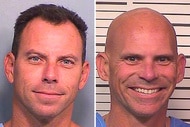Create a free profile to get unlimited access to exclusive videos, breaking news, sweepstakes, and more!
Texas Death Row Inmate Wants Execution Delayed So He Can Donate A Kidney
According to Ramiro Gonzales' spiritual advisor, donating a kidney before his execution would be a way "to help make his soul right with God.” The state of Texas is disinclined to allow it.

A Texas man on death row is seeking a delay in his upcoming execution so that he can donate one of his kidneys.
Ramiro Gonzales, 39, is scheduled to die by lethal injection on July 13 for his role in a 2001 murder, according to the Associated Press. On Wednesday, Gonzales’ attorneys made several requests to delay his execution, including one that relies on Gonzales’ stated desire to donate a kidney.
Attorneys Thea Posel and Raoul Schonemann specifically asked Governor Greg Abbott for a 30-day reprieve so that Gonzales could be considered for the organ donation, which could potentially be used to help “someone who is in urgent need of a kidney transplant.”
The lawyers noted that Gonzales was evaluated by the University of Texas Medical Branch’s transplant team in Galveston, Texas, who reportedly determined that Gonzales was an “excellent candidate” for donation due in part to a rare blood type.
“Virtually, all that remains is the surgery to remove Ramiro’s kidney,” attorneys wrote in their request to Abbott. “UTMB has confirmed that the procedure could be completed within a month.”
Posel and Shonemann submitted a separate request for a 180-day reprieve to the Texas Board of Pardons and Paroles for the same reason.
“For the past year and a half, our client Ramiro Gonzales has actively sought to become an organ donor prior to his scheduled execution,” Posel and Schonemann said in a statement e-mailed to Oxygen.com. “In keeping with his deeply held religious convictions, Ramiro seeks to atone for the life he has taken by sustaining life for another person in need.”
Speaking with the Associated Press, Texas Department of Criminal Justice spokesperson Amanda Hernandez said that Gonzales had unsuccessfully made requests to donate his kidney earlier this year. Although a specific reason for the denial wasn’t provided, Posel and Schonemann said the earlier decision was related to the date of Gonzales’ execution.
Though the Texas Department of Criminal Justice does allow some inmates to donate organs and tissues, per the Associated Press, it does not allow prisoners on death row close to their execution date to making living organ donations, according to the Texas Tribune — and medical ethicists and organ donation organizations have previously refused such donations in any case. (Posthumous organ donations by those executed are also not allowed, as NBC News noted, because the contents of a lethal injection and waiting until a condemned prisoner's heart stops could harm the organs intended for transplant, even if they could be ethically collected from the point of execution.)
Still, due to the scarcity of suitable organs for transplantation, the ethics of harvesting organs from inmates posthumously has long been a subject of debate, according to the Organ Procurement & Transplantation Network.
In their bid to Gov. Abbott, Posel and Schonemann — who both work with the University of Texas’s Capital Punishment Clinic at the School of Law in Austin — included a letter from Maryland-based cantor and chaplain Michael Zoosman, who regularly corresponds with Gonzales.
“There has been no doubt in my mind that Ramiro’s desire to be an altruistic kidney donor is not motivated by a last-minute attempt to stop or delay his execution,” said Zoosman. “I will go to my grave believing in my heart that this is something that Ramiro wants to do to help make his soul right with God.”
In their statement to Oxygen.com, Posel and Schonemann said their client was moved to donate one of his kidneys when learning that one of Zoosman’s congregants was in need of the organ.
“He knows that doing this will not stop his execution,” they said. “But as he told the Cantor, he hopes to give life before his own life is taken.
Ultimately, Posel and Schonemann said Gonzales was not a match to the congregant but claims his donation could help somebody else.
“The State, however, has thus far not consented to this request,” said Posel and Schonemann in their statement. “Approximately 13 people die each day waiting for a kidney transplant, and wait times for those with rare blood types can be as long as a decade. We have been inundated with emails and phone calls by people across the country who are in urgent need of a kidney transplant.”
The two lawyers also issued other requests that, if approved, would also affect Gonzales’ scheduled execution, according to the Associated Press. The first was to commute their client’s death sentence for a lesser penalty. The second was to put the brakes on the execution if Gonzales couldn’t have his spiritual advisor lay hands on him at the time of his death.
In March, the Supreme Court ruled in favor of Texas death row inmate John Henry Ramirez, whose request that his spiritual advisor perform a "laying of the hands" in the chamber during his execution had initially been denied by the state.
Gonzales' request for the same thing will be subject to a two-day federal trial which is expected to begin on Tuesday.
Gonzales confessed to the rape and murder of missing 18-year-old Bridget Townsend, who had disappeared in 2001, while he was serving two life sentences for the abduction and rape of a woman in Bandera County in 2002, according to the Palestine Herald-Press.
According to ABC San Antonio affiliate KSAT-TV, Gonzales confessed to abducting Townsend from his drug dealer’s home before raping her and shooting her to death on his family’s rural property. Gonzales said that confessing to killing Townsend was "the right thing to do” after hearing about the mother of his victim, KSAT-TV reported.
He was sentenced to death in 2006 and unsuccessfully appealed to have his conviction overturned in 2009, according to the Herald-Press.
“I have no qualms about dying,” Gonzales previously stated. “It doesn’t matter to me. It’s just a way out of prison.”
The Texas Board of Pardons and Paroles has until July 11 to vote on Gonzales’ request. Governor Greg Abbott has yet to respond.






















